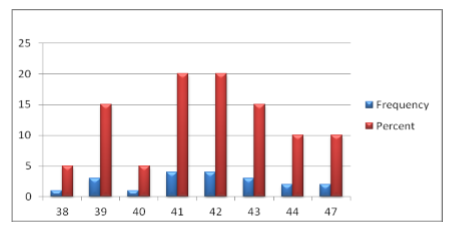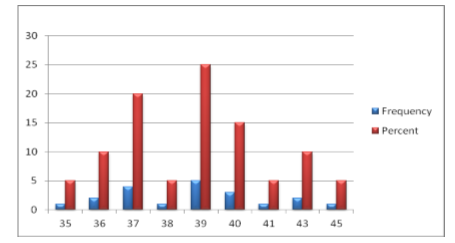Yatheendran A., Karalam S.R.B. (2012). Estimation of stress level among parents having epileptic children. Global Academic Society Journal: Social Science Insight, Vol. 5, No. 13, pp. 4-12. ISSN 2029-0365. [www.ScholarArticles.net]
Authors:
Aswani Yatheendran, Christ University, India
dr. Sheeja Remani Balakrishnan Karalam, Christ University Bangalore, India
Abstract
All parents experience stress and difficulties at times, but these raising children with special needs often face additional and unique challenges in care giving. Parents of children with epilepsy must learn a great deal of information about their child’s condition, visit hospitals frequently, work with medical professionals, make treatment decisions, adjust in family and adapt their original expectations for child. Parents may feel a wide range of emotions after learning that their child has epilepsy. The parents of children with epilepsy may face a lot of stress because of the children and their illness. And also there will be a difference in stress level between father and mother. In this study the researcher tried to study the difference of stress level among parents of children between the ages of 10 to 15 who is diagnosed as epileptic. And through this study the researcher proved that fathers with children with epilepsy have increased amount of stress compared to mothers.
Introduction
Stress is a feeling that’s created when we react to particular events. It’s the body’s way of rising to a challenge and preparing to meet a tough situation with focus, strength, stamina, and heightened alertness. Stress is defined as any physical or emotional demand that you feel unable to handle. While some stress is a normal part of life, excessive stress interferes with productivity and reduces physical and emotional health, so it’s important to find ways to keep it under control. Parenting stress is defined as those moments when life as a parent seems overwhelmingly unpredictable and uncontrollable. Parenting stress is important because it has been shown to be related to maltreatment and poor parent-child relationships. In this research the researchers are measuring the difference in stress level among parents of children having epilepsy.
Parental stress having epileptic children: theoretical approach
According to Deckard cited by Dubb (2008), parental stress is a set of process that lead to aversive psychological and physiological reactions arising from attempts to adapt to the demands of parenthood. And also Abidin in -yi (2007) publication defined parental stress as a stress resulting from parental dysfunctional behaviours or behavioural characteristics of the child. Parental stress is the single largest contributing factor to dismissive parenting and is also associated with a negative mood, which in turn may lead to parents’ negative attributions of children’s behaviour and to low tolerance of children’s misbehaviours. As a result, parent stress is a kid’s stress. Thus, understanding the precursors of parenting stress is important because of the potential implications for child development and adjustment, as well as parental adjustment. The seizures have the potential to interrupt normal routines by affecting a child’s behaviour or consciousness. This, in turn, can have impact on a family’s daily activities. However, as unsettling as a seizure itself may be, the inability in many cases to predict when, or if, another seizure will occur may have an even more profound impact on daily family life. Although the concerns may vary among family members, anxieties, fears, and even resentment can affect each family member’s self-image as well as how they interact with and feel about each other. Hung (2009) in the article “Psycho-social Impact of Epilepsy and Issues of Stigma” explains about Epilepsy as a very common medical condition that may occur among people of all ages, sex and races. The impact of epilepsy is also difficult for parents to fully admit and accept that their children are diagnosed as having epilepsy. The family can act as a buffer or stressor for all children and for those with epilepsy the stress a parent feels can affect the way they behave towards their child and the psychological impact upon the child’s adaptation to their condition and thus, the child’s self concept (Chiou and Hsieh, 2008; Modi, 2009). Parents may be anxious about their child’s diagnosis (Modi, 2009; Rantanen et al., 2009; Wagner et al., 2009) seeing them as different to other children. Parents can encourage dependence on them so that children do not develop their own competencies as parents can overprotect children (Wagner et al., 2009) at times being overly intrusive (Mcewan et al., 2004; Chiou and Hsieh, 2008). Rodenburg (2005) states that family of children with epilepsy would have more problems compared to controlled family in family functioning. All parents experience stress and difficulties at times, but raising children with special needs often face additional and unique challenges in care giving. Parents of children with epilepsy must learn a great deal of information about their child’s condition, visit hospitals frequently, work with medical professionals, make treatment decisions, adjust in family and adapt their original expectations for child. This research study among parents identifies the difference in stress level between the father and the mother of a child who undergoes treatment for epilepsy. And the researcher tries to prove that there is a difference in stress level among the father and mother of children who are under treatment of epilepsy.
Research methodology
The study was conducted using a descriptive design; a descriptive research design is the one which is description of the state of affairs as it exists at present. It is a fact-finding investigation with adequate interpretation. Universe of the study consists of all fathers and mothers of children of age group from 10 to 15 years old, having epilepsy and also they are undergoing treatment from the past 5 years in the “X” private hospital. Sampling population are parents of children under the age of 10-15 years old undergoing treatment for epilepsy from the past 5 years.
Measurement: The scale used for the data collection is Parental Stress Scale (Berry and Jones, 1995). The Parental Stress Scale is a self-report scale that contains 18 items representing pleasure or positive themes of parenthood (emotional benefits, self-enrichment, personal development) and negative components (demands on resources, opportunity costs and restrictions). It is a five point scale. The Parental Stress Scale demonstrated satisfactory levels of internal reliability (.83), and test-retest reliability (.81). The scale demonstrated satisfactory convergent validity with various measures of stress, emotion, and role satisfaction, including perceived stress, work/family stress, loneliness, anxiety, guilt, marital satisfaction, marital commitment, job satisfaction, and social support. Discrimination analysis demonstrated the ability of the scale to discriminate between parents of typically developing children and parents of children with both developmental and behavioural problems.
Hypotheses are as follow:
H1: There is a significant difference in the stress level of fathers and mothers with children having epilepsy.
H0: There is no significant difference in the stress level of fathers and mothers with children having epilepsy.
Results and findings: The data was collected from 40 parents i.e., 20 mothers and 20 fathers. And another inclusion criterion was those parents of children with epilepsy and also who was undergoing treatment from the past 5 years in “X” private hospital. The following are the frequency tables that represent the socio demographic details of the samples in the research. In the study the age of father comes in between 38-47 years (see Figure 1). Figure 1 represents the majority of fathers are 20% of age 41 and 42 years.
Figure 2 indicates the age of mother in the study. In the Figure 2 it shows the frequency and percentage, here it explains that the majority i.e., 25% are of age 39 years.
Figure 3 represents the occupation of fathers. It explains the percentage of fathers working in each area. The areas of occupation are business, construction, daily wage, engineer, government employee and teacher. In that 40% of them work in the government sector, 25% work in the business sector, 15% of fathers work in the engineering field, 10% of fathers work as daily wagers and 5% in the construction field.
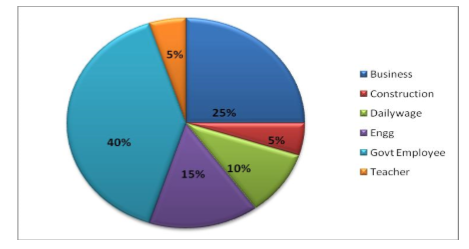 Figure 3. Occupation of father
Figure 3. Occupation of father
Figure 4 explains the occupation of mothers of children with epilepsy. In that 80% of them are home makers, 10% are teachers, and 5% each are government employee and private employee. So it clearly indicates that majority of the mothers are home makers.
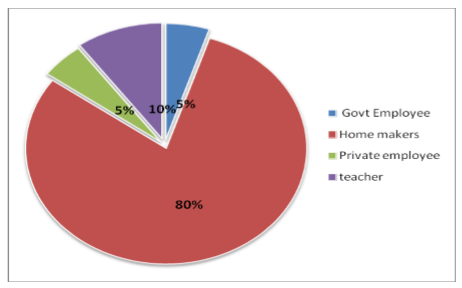 Figure 4. Occupation of mother
Figure 4. Occupation of mother
Figure 5 explains the average monthly income of the family. According to the Figure 5, it shows the percentage and frequency level of the income of the family. 20% of the families have a monthly income of 25000 rupees. But they have to spend it for rent, household things, children’s education, medicines, etc. 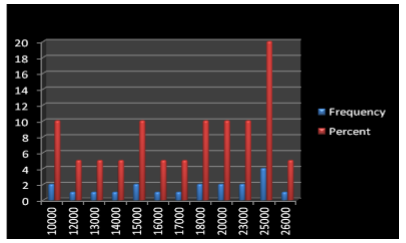
Figure 5. Average income in Rupee
Figure 6 explains the percentage of age of children who are under treatment for epilepsy from the past 5 years. The figure shows that 45% of children are of age 12 years, 20% of children are of age 13 years, 15% – of age 11 and 14 years, 5% are of age 15 years.
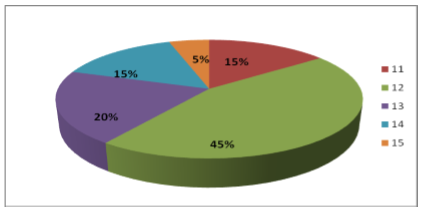 Figure 6. Age of epileptic children
Figure 6. Age of epileptic children
This study has revealed that there is a significant difference between the stress level amongst fathers and mothers of children with epilepsy (see Table 1).
 Table 1. Stress level of mother and father
Table 1. Stress level of mother and father
This finding has verified the hypothesis of the study, which is H1: “There is a significant difference between the stress level amongst the fathers and mothers of children with epilepsy.” The significant difference between the two variables is at a 0.037 significance level (see Table 1). This comes down to the fact that fathers of children with epilepsy have higher stress level as compared to that of the mothers (see Figure 7). 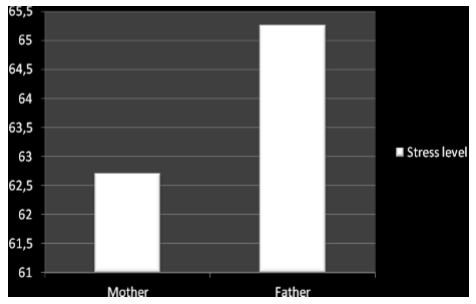 Figure 7. Stress level among fathers and mothers of children with epilepsy
Figure 7. Stress level among fathers and mothers of children with epilepsy
Figure 8 shows the questions were the stress level of father is higher compared to mothers. And the following are the questions:
Q2: There is little or nothing I wouldn’t do for my child(ren) if it was necessary.
Q3: Caring for my child(ren) sometimes takes more time and energy than I have to give.
Q5: I feel close to my child(ren).
Q7: My child(ren) is an important source of affection for me.
Q10: Having child(ren) leaves little time and flexibility in my life
. Q11: Having child(ren) has been a financial burden.
Q13: The behaviour of my child(ren) is often embarrassing or stressful to me.
Q17: I am satisfied as a parent. 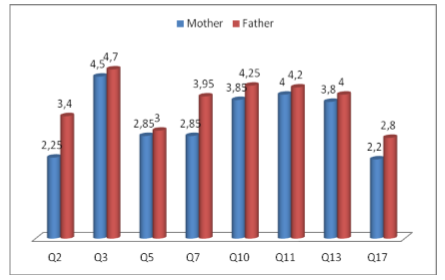
Figure 8. Stress difference among mothers and fathers
So these are the 8 questions in the scale were it reported that the paternal stress is more when they have children in between the age 10-15 years under the treatment of epilepsy.
Conclusions
The conclusion of the study is fathers with children having epilepsy deals with higher amount of stress level compared to mothers. And one among the reason is that most of the mothers are home makers and so they will get more time to spend with their child and also time for themselves while fathers are the breadwinners, they have to runner the family. While father have more responsibilities compared to mothers in this cases. Here these fathers are not having time to spend for themselves and to relax. So it is really a stressful situation for them.
References
- Berry J.O., Jones W.H. (1995) The Parental Stress Scale: Initial psychometric evidence. Journal of Social and Personal Relationships, No. 12, pp. 463-472.
- Chiou H.-H., Hsieh L.-P. (2008) Parenting Stress in Parents of Children With Epilepsy and Asthma. J Child Neurol, March, Vol. 23, No. 3, pp. 301-306.
- Dubb J.L. (2008) Parent stress reduction through a psychosocial intervention. Pennsylvani.
- Hung T.F.A. (2009) Psycho-social Impact of Epilepsy and Issues of Stigma. Medical bulletin, Vol. 14, No.5
- McEwan M.J., Espie C.A., Metcalfe J., Brodie M.J., Wilson M.T. (2004) Quality of life and psychosocial development in adolescents with epilepsy: a qualitative investigation using focus group methods. Seizure 13, pp. 15-31.
- Modi A. C. (2009) The Impact of a New Pediatric Epilepsy Diagnosis on Parents: Parenting Stress and Activity Patterns. Epilepsy and Behavior, January, pp. 237-242.
- Rantanen K., Timonen S., Hagström K., Hämäläinen P., Eriksson K., Nieminen P. (2009) Social competence of preschool children with epilepsy. Epilepsy and Behaviour 14, pp. 338-343.
- Rodenburg R., Meijer A.M., Deković M., Aldenkamp A.P. (2005) Family factors and psychopathology in children with epilepsy. Epilepsy & Behavior, Vol. 6, pp. 488-503.
- Wagner J.L., Sample P.L., Ferguson P. L., Pickelsimer E.E., Smith G.M., Selassie A.W. (2009) Impact of pediatric epilepsy: Voices from a focus group and implications for public policy change. Epilepsy Behav, 16, pp. 161165.
- -yi T. P. (2007) Perceived social support and marital satisfaction: a moderator on parental stress in Hong Kong, Hong Kong.

